语法知识—祈使句的全集汇编附答案
- 格式:docx
- 大小:15.82 KB
- 文档页数:8
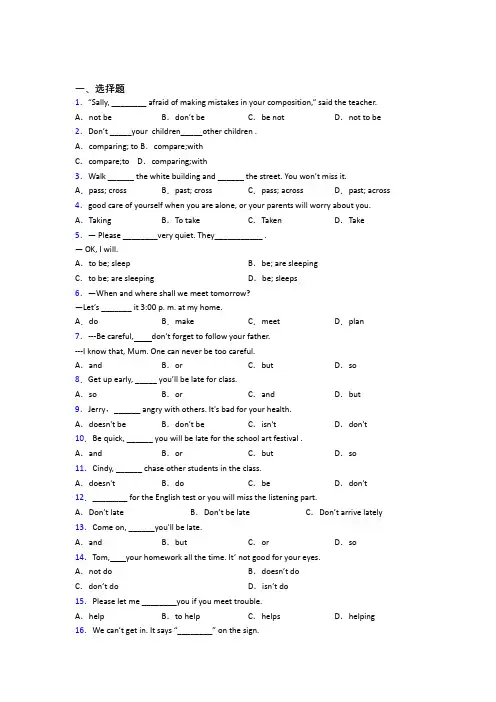
一、选择题1.“Sally, ________ afraid of making mistakes in your composition,” said the teacher. A.not be B.don’t be C.be not D.not to be 2.Don’t _____your children_____other children .A.comparing; to B.compare;withC.compare;to D.comparing;with3.Walk ______ the white building and ______ the street. You won’t miss it. A.pass; cross B.past; cross C.pass; across D.past; across 4.good care of yourself when you are alone, or your parents will worry about you. A.Taking B.To take C.Taken D.Take 5.— Please ________very quiet. They___________ .— OK, I will.A.to be; sleep B.be; are sleepingC.to be; are sleeping D.be; sleeps6.—When and where shall we meet tomorrow?—Let’s _______ it 3:00 p. m. at my home.A.do B.make C.meet D.plan 7.---Be careful, don’t forget to follow your father.---I know that, Mum. One can never be too careful.A.and B.or C.but D.so 8.Get up early, _____ you’ll be late for class.A.so B.or C.and D.but 9.Jerry,______ angry with others. It's bad for your health.A.doesn't be B.don't be C.isn't D.don't 10.Be quick, ______ you will be late for the school art festival .A.and B.or C.but D.so 11.Cindy, ______ chase other students in the class.A.doesn't B.do C.be D.don't 12.________ for the English test or you will miss the listening part.A.Don’t late B.Don’t be late C.Don’t arrive lately 13.Come on, ______you'll be late.A.and B.but C.or D.so 14.Tom, your homework all the time. It’ not good for your eyes.A.not do B.doesn’t doC.don’t do D.isn’t do15.Please let me ________you if you meet trouble.A.help B.to help C.helps D.helping 16.We can’t get in. It says “________” on the sign.A.No smoking B.No touchingC.No entry D.No shouting17.“_______ exercise every day, my child. It’s good for your health,” Father said.A.Taking B.Took C.Take D.Takes18.---Mike, ___________ run in the hallways.一Sorry, Ms. Clark.A.don't B.doesn't C.let's D.please19.Work hard, __________ you may not catch up with your classmates soon.A.but B.or C.and D.yet20.________an icon at the bottom of the page then ______, and you will get more information about the city.A.Picking, click it on B.Picking; click on it C.Pick; click it on D.Pick; click on it 21.________ hard, and you will be ________.A.To study; best B.Study; best C.Studying; the best D.Study; the best 22.______ exercise, and you will be healthier.A.To keep B.Keep C.Keeping D.Kept23._____away from the river,young kids.It’s too dangerous.A.Stays B.Staying C.To stay D.Stay24.—________ listen to music in the classroom.—Sorry. I won’t do it again.A.Not B.Can’t C.Don’t25.—______________.—G-R-E-E-N, green.A.What's this? B.What color is it? C.Spell it, please.【参考答案】***试卷处理标记,请不要删除一、选择题1.B解析:B【解析】【详解】句意:老师说:“萨利,不要害怕在作文中犯错误。
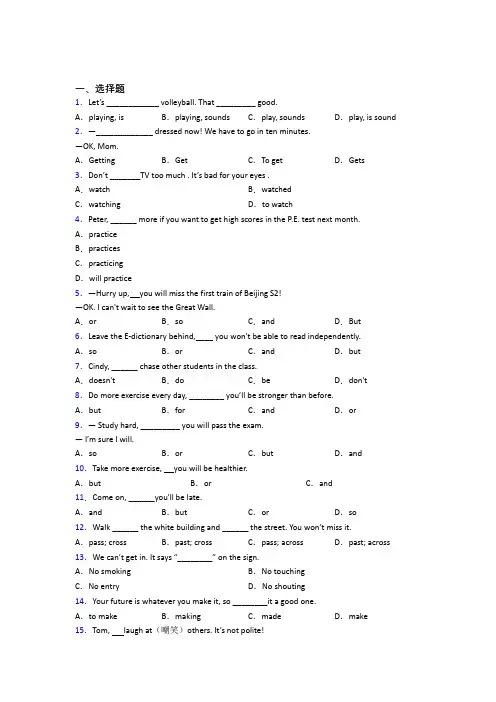
一、选择题1.Let’s ____________ volleyball. That _________ good.A.playing, is B.playing, sounds C.play, sounds D.play, is sound 2.—_____________ dressed now! We have to go in ten minutes.—OK, Mom.A.Getting B.Get C.To get D.Gets 3.Don’t _______TV too much . It’s bad for your eyes .A.watch B.watchedC.watching D.to watch4.Peter, ______ more if you want to get high scores in the P.E. test next month. A.practiceB.practicesC.practicingD.will practice5.—Hurry up, you will miss the first train of Beijing S2!—OK. I can't wait to see the Great Wall.A.or B.so C.and D.But 6.Leave the E-dictionary behind,____ you won't be able to read independently.A.so B.or C.and D.but 7.Cindy, ______ chase other students in the class.A.doesn't B.do C.be D.don't 8.Do more exercise every day, ________ you’ll be stronger than before.A.but B.for C.and D.or9.— Study hard, _________ you will pass the exam.—I’m sure I will.A.so B.or C.but D.and 10.Take more exercise, you will be healthier.A.but B.or C.and11.Come on, ______you'll be late.A.and B.but C.or D.so 12.Walk ______ the white building and ______ the street. You won’t miss it. A.pass; cross B.past; cross C.pass; across D.past; across 13.We can’t get in. It says “________” on the sign.A.No smoking B.No touchingC.No entry D.No shouting14.Your future is whatever you make it, so ________it a good one.A.to make B.making C.made D.make 15.Tom, laugh at(嘲笑)others. It’s not polite!A.don't B.doesn’t C.not D.don't be16.---Mike, ___________ run in the hallways.一Sorry, Ms. Clark.A.don't B.doesn't C.let's D.please17.________to guess the word’s meaning by reading the sentences before or after it.A.Try B.To try C.Trying D.Tried18.— Daniel, _________ be late for school again!—Sorry, Mrs. Lin. I won’t.A.doesn’t B.don’t C.isn’t D.won’t19.Work hard, ________ you’ll have a big success.A.and B.but C.or D.for20.Dave, late for class again and you must follow the school rules.A.doesn't arrive B.arrives C.don't arrive21.________ any more. It’s no use. We will not buy you any chocolate.A.You don’t cry B.If you cry C.Don’t cry D.Stop crying 22.Study hard, ________you ________pass the exam.A.and, won’t B.or, will C.or, / D.and, will 23.—Don’t forget to call me when you arrive there.—________.A.No, I won’t B.Yes, I have C.You’re welcome D.No, thanks 24.—Could you take me to the cinema? I want to see the movie named Pacific Rim (《环太平洋》).—______ your homework first, and then we’ll talk about it.A.Finish B.FinishedC.To finish D.Finishing25.Hurry up, _________ you will be late for class.A.and B.or C.but D.so【参考答案】***试卷处理标记,请不要删除一、选择题1.C解析:C【解析】【详解】句意: 让我们打排球吧,听起来不错。
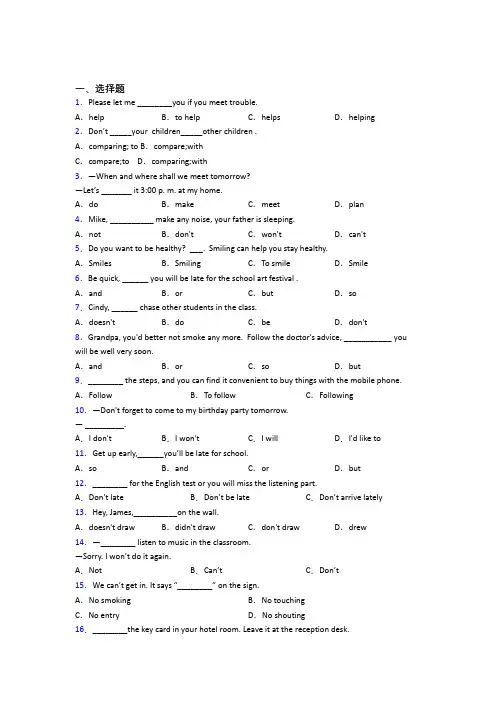
一、选择题1.Please let me ________you if you meet trouble.A.help B.to help C.helps D.helping 2.Don’t _____your children_____other children .A.comparing; to B.compare;withC.compare;to D.comparing;with3.—When and where shall we meet tomorrow?—Let’s _______ it 3:00 p. m. at my home.A.do B.make C.meet D.plan 4.Mike, __________ make any noise, your father is sleeping.A.not B.don't C.won't D.can't5.Do you want to be healthy? ___. Smiling can help you stay healthy.A.Smiles B.Smiling C.To smile D.Smile6.Be quick, ______ you will be late for the school art festival .A.and B.or C.but D.so 7.Cindy, ______ chase other students in the class.A.doesn't B.do C.be D.don't 8.Grandpa, you'd better not smoke any more. Follow the doctor's advice, ___________ you will be well very soon.A.and B.or C.so D.but9.________ the steps, and you can find it convenient to buy things with the mobile phone. A.Follow B.To follow C.Following10.—Don't forget to come to my birthday party tomorrow.— _________.A.I don't B.I won't C.I will D.I'd like to 11.Get up early,______you’ll be late for school.A.so B.and C.or D.but12.________ for the English test or you will miss the listening part.A.Don’t late B.Don’t be late C.Don’t arrive lately 13.Hey, James,__________on the wall.A.doesn't draw B.didn't draw C.don't draw D.drew 14.—________ listen to music in the classroom.—Sorry. I won’t do it again.A.Not B.Can’t C.Don’t15.We can’t get in. It says “________” on the sign.A.No smoking B.No touchingC.No entry D.No shouting16.________the key card in your hotel room. Leave it at the reception desk.A.No leave B.Not leave C.Don't leave D.No leaving 17.—Let’s __________ volleyball.— That __________ good.A.playing;sounds B.play;soundsC.play;sound D.plays;sound18.Tom, laugh at(嘲笑)others. It’s not polite!A.don't B.doesn’t C.not D.don't be 19.Work hard, __________ you may not catch up with your classmates soon.A.but B.or C.and D.yet20.—Let’s______ to the songs at the Beach Music Festival this Friday night.—Good idea! I like music.A.listening B.listen C.listens D.to listen 21.—Don’t wake up your sister, Ben. She needs a good sleep. — ___________ .A.OK, I don’t.B.Yes, I do.C.OK, I won’t.D.Yes, I will.22.________ any more. It’s no use. We will not buy you any chocolate.A.You don’t cry B.If you cry C.Don’t cry D.Stop crying 23.Tom, please. I am afraid it will take you one more hour your homework.A.be quick; finish B.is quick; finishing C.be quick; to finish D.be quickly; to finish 24.—I am feeling ill. What should I do?— eating junk food and breakfast every day.A.Stop; having B.Stop; have C.To stop; have. D.To stop; to have 25.-Let's make fruit salad.- _____________ .A.No,I'm not B.Thank you C.That's all right D.That's a good idea 【参考答案】***试卷处理标记,请不要删除一、选择题1.A解析:A【解析】【详解】句意:如果你遇到困难请让我帮助你。
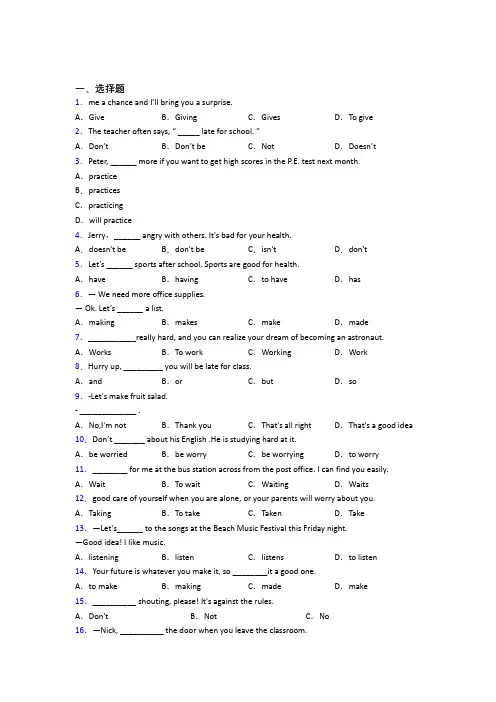
一、选择题1.me a chance and I’ll bring you a surprise.A.Give B.Giving C.Gives D.To give2.The teacher often says, “ _____ late for school. ”A.Don’t B.Don’t be C.Not D.Doesn’t 3.Peter, ______ more if you want to get high scores in the P.E. test next month. A.practiceB.practicesC.practicingD.will practice4.Jerry,______ angry with others. It's bad for your health.A.doesn't be B.don't be C.isn't D.don't5.Let’s ______ sports after school. Sports are good for health.A.have B.having C.to have D.has6.— We need more office supplies.—Ok. Let’s ______ a list.A.making B.makes C.make D.made7.___________really hard, and you can realize your dream of becoming an astronaut. A.Works B.To work C.Working D.Work8.Hurry up, _________ you will be late for class.A.and B.or C.but D.so9.-Let's make fruit salad.- _____________ .A.No,I'm not B.Thank you C.That's all right D.That's a good idea 10.Don’t _______ about his English .He is studying hard at it.A.be worried B.be worry C.be worrying D.to worry11.________ for me at the bus station across from the post office. I can find you easily. A.Wait B.To wait C.Waiting D.Waits 12.good care of yourself when you are alone, or your parents will worry about you. A.Taking B.To take C.Taken D.Take 13.—Let’s______ t o the songs at the Beach Music Festival this Friday night.—Good idea! I like music.A.listening B.listen C.listens D.to listen 14.Your future is whatever you make it, so ________it a good one.A.to make B.making C.made D.make15.__________ shouting, please! It's against the rules.A.Don't B.Not C.No16.—Nick, __________ the door when you leave the classroom.—All right. I will.A.to close B.closing C.closed D.close17.—Miss Green, would you please tell me how to improve my English?—_____ a study group, and you’ll get help from others.A.Join B.Joining C.To join D.If you join18.Let's __________ tennis in the playground.()A.play B.to play C.plays D.to plays19.o music to make you feel happy when you are sad.A.To listen B.Listens C.Listening D.Listen 20.—Don’t wake up your sister, Ben. She needs a good sleep. — ___________ .A.OK, I don’t.B.Yes, I do.C.OK, I won’t.D.Yes, I will.21.Study hard, ________you ________pass the exam.A.and, won’t B.or, will C.or, / D.and, will22.—________ listen to music in the classroom.—Sorry. I won’t do it again.A.Not B.Can’t C.Don’t23.Alice, it's time for school. Let me _______, or I will be late for class.A.go B.come C.to go D.to come 24.Please______the rubbish into different litter bins according to the signs.A.puts B.put C.putting D.to put25.— Daniel, _________ be late for school again!—Sorry, Mrs. Lin. I won’t.A.doesn’t B.don’t C.isn’t D.won’t【参考答案】***试卷处理标记,请不要删除一、选择题1.A解析:A【解析】【分析】【详解】句意:给我一个机会,我会给你带来惊喜。
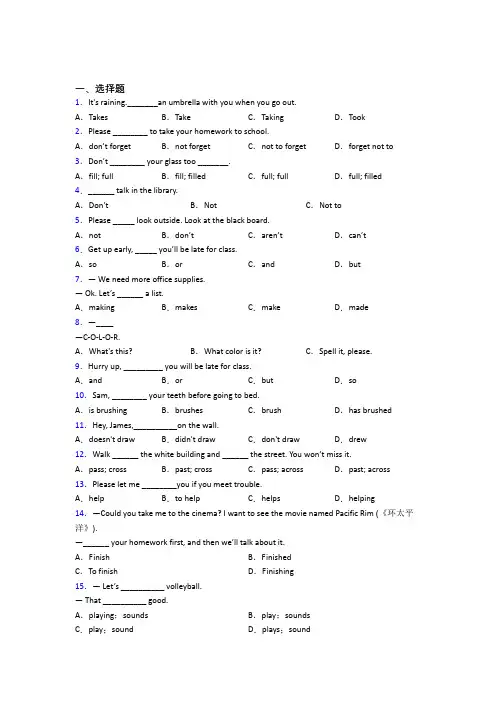
一、选择题1.It's raining._______an umbrella with you when you go out.A.Takes B.Take C.Taking D.Took 2.Please ________ to take your homework to school.A.don’t forget B.not forget C.not to forget D.forget not to 3.Don’t ________ your glass too _______.A.fill; full B.fill; filled C.full; full D.full; filled4.______ talk in the library.A.Don’t B.Not C.Not to5.Please _____ look outside. Look at the black board.A.not B.don’t C.aren’t D.can’t6.Get up early, _____ you’ll be late for class.A.so B.or C.and D.but7.— We need more office supplies.—Ok. Let’s ______ a list.A.making B.makes C.make D.made8.—____—C-O-L-O-R.A.What's this? B.What color is it? C.Spell it, please. 9.Hurry up, _________ you will be late for class.A.and B.or C.but D.so10.Sam, ________ your teeth before going to bed.A.is brushing B.brushes C.brush D.has brushed 11.Hey, James,__________on the wall.A.doesn't draw B.didn't draw C.don't draw D.drew12.Walk ______ the white building and ______ the street. You won’t miss it.A.pass; cross B.past; cross C.pass; across D.past; across 13.Please let me ________you if you meet trouble.A.help B.to help C.helps D.helping 14.—Could you take me to the cinema? I want to see the movie named Pacific Rim (《环太平洋》).—______ your homework fi rst, and then we’ll talk about it.A.Finish B.FinishedC.To finish D.Finishing15.—Let’s __________ volleyball.— That __________ good.A.playing;sounds B.play;soundsC.play;sound D.plays;sound16.________ for me at the bus station across from the post office. I can find you easily. A.Wait B.To wait C.Waiting D.Waits17.—______ the living room blue, Andrew.—OK, mum. What about orange?A.Doesn't paint B.Didn't paint C.Not paint D.Don't paint 18.—Let’s______ to the songs at the Beach Music Festival this Friday night.—Good idea! I like music.A.listening B.listen C.listens D.to listen19.me a chance and I’ll bring you a surprise.A.Give B.Giving C.Gives D.To give 20.—Nick, __________ the door when you leave the classroom.—All right. I will.A.to close B.closing C.closed D.close21.Let's __________ tennis in the playground.()A.play B.to play C.plays D.to plays22.o music to make you feel happy when you are sad.A.To listen B.Listens C.Listening D.Listen23.________ any more. It’s no use. We will not buy you any chocolate.A.You don’t cry B.If you cry C.Don’t cry D.Stop crying 24.—Don’t forget to call me when you arrive there.—________.A.No, I won’t B.Yes, I have C.You’re welcome D.No, thanks 25.“Sally, ________ afraid of making mistakes in your composition,” said the teacher.A.not be B.don’t be C.be not D.not to be【参考答案】***试卷处理标记,请不要删除一、选择题1.B解析:B【解析】【详解】句意:下雨了,当你出去的时候,随身携带一把雨伞。
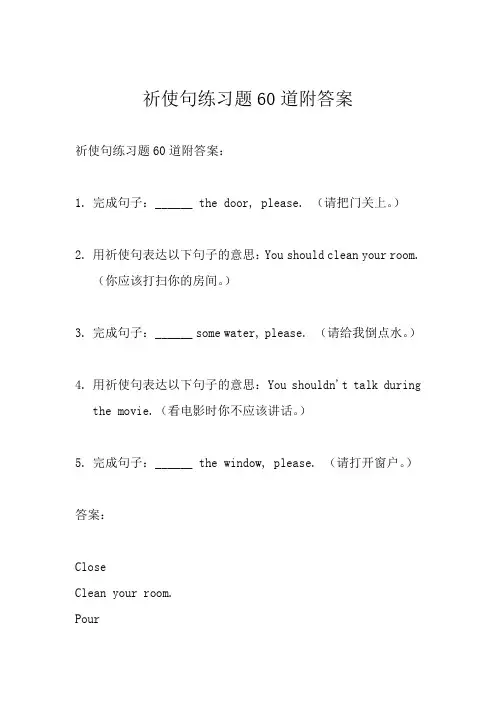
祈使句练习题60道附答案祈使句练习题60道附答案:1.完成句子:______ the door, please. (请把门关上。
)2.用祈使句表达以下句子的意思:You should clean your room.(你应该打扫你的房间。
)3.完成句子:______ some water, please. (请给我倒点水。
)4.用祈使句表达以下句子的意思:You shouldn't talk duringthe movie.(看电影时你不应该讲话。
)5.完成句子:______ the window, please. (请打开窗户。
)答案:CloseClean your room.PourDon't talk during the movie.Open6.用祈使句表达以下句子的意思:Please don't forget to buymilk on your way home.(请别忘了在回家路上买牛奶。
)7.完成句子:______ the dishes, please. (请洗碗。
)8.用祈使句表达以下句子的意思:You should turn off thelights when you leave the room.(你离开房间时应该关灯。
)9.完成句子:______ the book to me, please. (请把书递给我。
)10.用祈使句表达以下句子的意思:Don't play with fire.(不要玩火。
)答案:Don't forget to buy milk on your way home.WashTurn off the lights when you leave the room.PassDon't play with fire.11.完成句子:______ the music, please. (请开音乐。
)12.用祈使句表达以下句子的意思:You need to eat morevegetables.(你需要多吃点蔬菜。
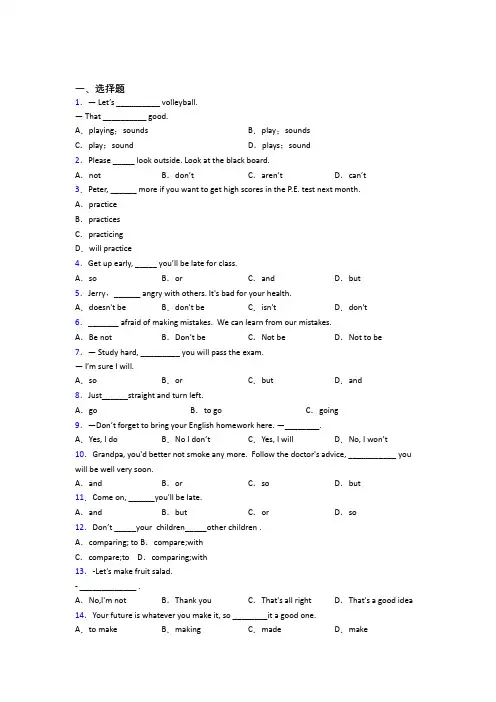
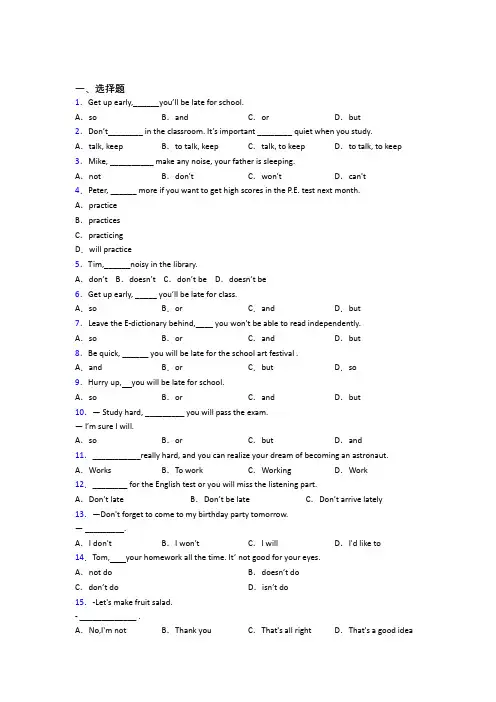
一、选择题1.Get up early,______you’ll be late for school.A.so B.and C.or D.but2.Don’t________ in the classroom. It’s important ________ quiet when you study. A.talk, keep B.to talk, keep C.talk, to keep D.to talk, to keep 3.Mike, __________ make any noise, your father is sleeping.A.not B.don't C.won't D.can't 4.Peter, ______ more if you want to get high scores in the P.E. test next month. A.practiceB.practicesC.practicingD.will practice5.Tim,______noisy in the library.A.don’t B.doesn’t C.d on’t be D.doesn’t be6.Get up early, _____ you’ll be late for class.A.so B.or C.and D.but7.Leave the E-dictionary behind,____ you won't be able to read independently.A.so B.or C.and D.but8.Be quick, ______ you will be late for the school art festival .A.and B.or C.but D.so9.Hurry up, you will be late for school.A.so B.or C.and D.but10.— Study hard, _________ you will pass the exam.—I’m sure I will.A.so B.or C.but D.and11.___________really hard, and you can realize your dream of becoming an astronaut. A.Works B.To work C.Working D.Work12.________ for the English test or you will miss the listening part.A.Don’t late B.Don’t be late C.Don’t arrive lately 13.—Don't forget to come to my birthday party tomorrow.— _________.A.I don't B.I won't C.I will D.I'd like to 14.Tom, your homework all the time. It’ not good for your eyes.A.not do B.doesn’t doC.don’t do D.isn’t do15.-Let's make fruit salad.- _____________ .A.No,I'm not B.Thank you C.That's all right D.That's a good idea16.“Sally, ________ afraid of making mistakes in your composition,” said the teacher.A.not be B.don’t be C.be not D.not to be 17.Tom, laugh at(嘲笑)others. It’s not polite!A.don't B.doesn’t C.not D.don't be18.________ for me at the bus station across from the post office. I can find you easily. A.Wait B.To wait C.Waiting D.Waits19.__________ shouting, please! It's against the rules.A.Don't B.Not C.No20.o music to make you feel happy when you are sad.A.To listen B.Listens C.Listening D.Listen21.________ hard, and you will be ________.A.To study; best B.Study; best C.Studying; the best D.Study; the best 22.Tom, please. I am afraid it will take you one more hour your homework.A.be quick; finish B.is quick; finishing C.be quick; to finish D.be quickly; to finish 23.—I am feeling ill. What should I do?— eating junk food and breakfast every day.A.Stop; having B.Stop; have C.To stop; have. D.To stop; to have 24.—Could you take me to the cinema? I want to see the movie named Pacific Rim (《环太平洋》).—______ your homework first, and then we’ll talk about it.A.Finish B.FinishedC.To finish D.Finishing25.Let’s _____TV.That _____boring. Can we go out to play games?A.watching,sounds B.watch,sound C.watching,sound D.watch,sounds【参考答案】***试卷处理标记,请不要删除一、选择题1.C解析:C【解析】【分析】【详解】句意:早点起床,否则你会上学迟到。
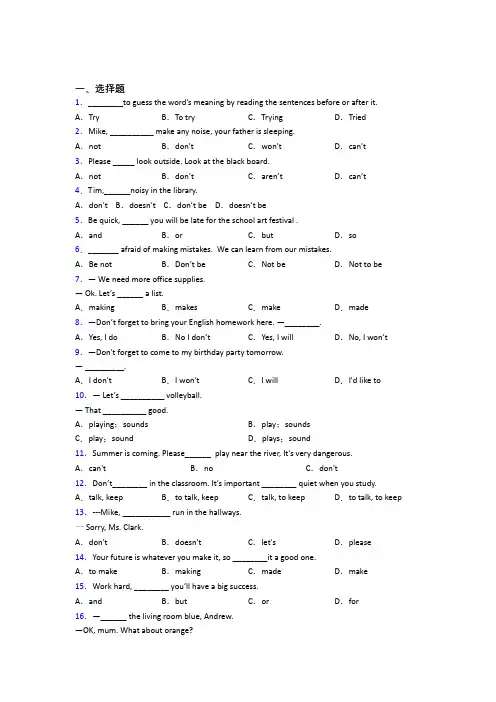
一、选择题1.________to guess the word’s meaning by reading the sentences before or after it. A.Try B.To try C.Trying D.Tried 2.Mike, __________ make any noise, your father is sleeping.A.not B.don't C.won't D.can't 3.Please _____ look outside. Look at the black board.A.not B.don’t C.aren’t D.can’t 4.Tim,______noisy in the library.A.don’t B.doesn’t C.don’t be D.doesn’t be5.Be quick, ______ you will be late for the school art festival .A.and B.or C.but D.so6._______ afraid of making mistakes. We can learn from our mistakes.A.Be not B.Don’t be C.Not be D.Not to be 7.— We need more office supplies.—Ok. Let’s ______ a list.A.making B.makes C.make D.made 8.—Don’t forget to bring your English homework here. —________.A.Yes, I do B.No I don’t C.Yes, I will D.No, I won’t 9.—Don't forget to come to my birthday party tomorrow.— _________.A.I don't B.I won't C.I will D.I'd like to 10.—Let’s __________ volleyball.— That __________ good.A.playing;sounds B.play;soundsC.play;sound D.plays;sound11.Summer is coming. Please______ play near the river, It's very dangerous.A.can't B.no C.don't12.Don’t________ in the classroom. It’s important ________ quiet when you study. A.talk, keep B.to talk, keep C.talk, to keep D.to talk, to keep 13.---Mike, ___________ run in the hallways.一Sorry, Ms. Clark.A.don't B.doesn't C.let's D.please 14.Your future is whatever you make it, so ________it a good one.A.to make B.making C.made D.make 15.Work hard, ________ you’ll have a big success.A.and B.but C.or D.for16.—______ the living room blue, Andrew.—OK, mum. What about orange?A.Doesn't paint B.Didn't paint C.Not paint D.Don't paint 17.—Let’s______ to the songs at the Beach Music Festival this Friday night.—Good idea! I like music.A.listening B.listen C.listens D.to listen 18.—Miss Green, would you please tell me how to improve my English?—_____ a study group, and you’ll get help from others.A.Join B.Joining C.To join D.If you join 19.Let's __________ tennis in the playground.()A.play B.to play C.plays D.to plays20.________ hard, and you will be ________.A.To study; best B.Study; best C.Studying; the best D.Study; the best 21.Don't be late for school again, _________?A.do you B.don't you C.won't you D.will you 22.Study hard, ________you ________pass the exam.A.and, won’t B.or, will C.or, / D.and, will 23.Please_____late for school.A.isn’t B.aren’t C.don’t be D.not be 24.—Could you take me to the cinema? I want to see the movie named Pacific Rim (《环太平洋》).—______ your homework first, and then we’ll talk about it.A.Finish B.FinishedC.To finish D.Finishing25.________ for me at the bus station across from the post office. I can find you easily. A.Wait B.To wait C.Waiting D.Waits【参考答案】***试卷处理标记,请不要删除一、选择题1.A解析:A【解析】【详解】句意:尽力通过阅读它的前后句来猜测单词的意思。
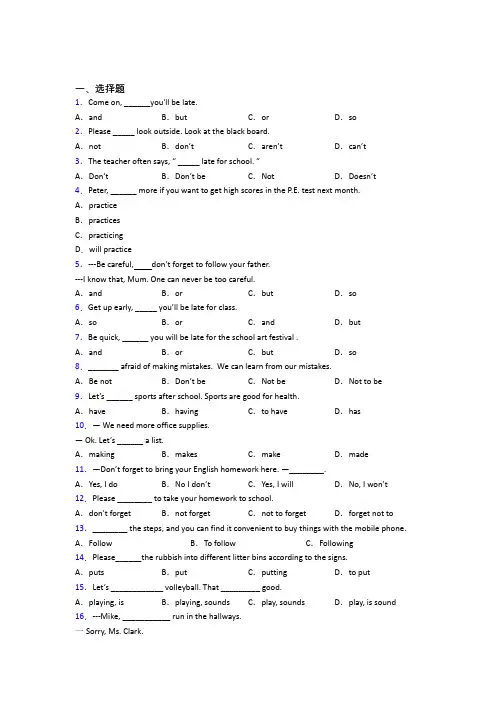
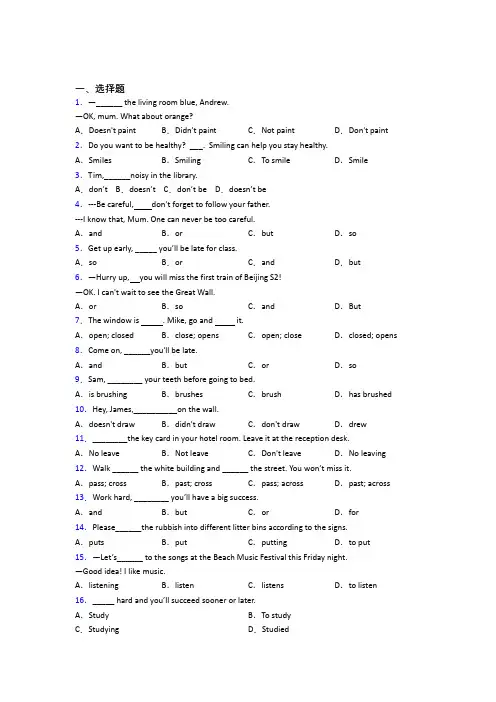
一、选择题1.—______ the living room blue, Andrew.—OK, mum. What about orange?A.Doesn't paint B.Didn't paint C.Not paint D.Don't paint 2.Do you want to be healthy? ___. Smiling can help you stay healthy.A.Smiles B.Smiling C.To smile D.Smile 3.Tim,______noisy in the library.A.don’t B.doesn’t C.don’t be D.doesn’t be4.---Be careful, don’t forget to follow your father.---I know that, Mum. One can never be too careful.A.and B.or C.but D.so5.Get up early, _____ you’ll be late fo r class.A.so B.or C.and D.but 6.—Hurry up, you will miss the first train of Beijing S2!—OK. I can't wait to see the Great Wall.A.or B.so C.and D.But7.The window is . Mike, go and it.A.open; closed B.close; opens C.open; close D.closed; opens 8.Come on, ______you'll be late.A.and B.but C.or D.so 9.Sam, ________ your teeth before going to bed.A.is brushing B.brushes C.brush D.has brushed 10.Hey, James,__________on the wall.A.doesn't draw B.didn't draw C.don't draw D.drew 11.________the key card in your hotel room. Leave it at the reception desk.A.No leave B.Not leave C.Don't leave D.No leaving 12.Walk ______ the white building and ______ the street. You won’t miss it. A.pass; cross B.past; cross C.pass; across D.past; across 13.Work hard, ________ you’ll have a big success.A.and B.but C.or D.for 14.Please______the rubbish into different litter bins according to the signs.A.puts B.put C.putting D.to put 15.—Let’s______ to the songs at the Beach Music Festival this Friday nigh t.—Good idea! I like music.A.listening B.listen C.listens D.to listen 16._____ hard and you’ll succeed sooner or later.A.Study B.To studyC.Studying D.Studied17.Let's __________ tennis in the playground.()A.play B.to play C.plays D.to plays 18.—Don’t wake up your sister, Ben. She needs a good sleep. — ___________ .A.OK, I don’t.B.Yes, I do.C.OK, I won’t.D.Yes, I will.19.Don't be late for school again, _________?A.do you B.don't you C.won't you D.will you20.________ any more. It’s no us e. We will not buy you any chocolate.A.You don’t cry B.If you cry C.Don’t cry D.Stop crying 21.Tom, please. I am afraid it will take you one more hour your homework.A.be quick; finish B.is quick; finishing C.be quick; to finish D.be quickly; to finish 22.Practice more, _______ you’ll learn English better.A.or B.so C.and D.but23.—________ listen to music in the classroom.—Sorry. I won’t do it again.A.Not B.Can’t C.Don’t24.Alice, it's time for school. Let me _______, or I will be late for class.A.go B.come C.to go D.to come 25.—Let’s __________ volleyball.— That __________ good.A.playing;sounds B.play;soundsC.play;sound D.plays;sound【参考答案】***试卷处理标记,请不要删除一、选择题1.D解析:D【解析】【详解】句意:——安德鲁,不要把客厅漆成蓝色。
精选全文完整版一、选择题1.Summer is coming. Please______ play near the river, It's very dangerous.A.can't B.no C.don't2.______ talk in the library.A.Don’t B.Not C.Not to3.Mike, __________ make any noise, your father is sleeping.A.not B.don't C.won't D.can't 4.Peter, ______ more if you want to get high scores in the P.E. test next month. A.practiceB.practicesC.practicingD.will practice5.—Hurry up, you will miss the first train of Beijing S2!—OK. I can't wait to see the Great Wall.A.or B.so C.and D.But6._______ afraid of making mistakes. We can learn from our mistakes.A.Be not B.Don’t be C.Not be D.Not to be 7.Cindy, ______ chase other students in the class.A.doesn't B.do C.be D.don't 8.Do more exercise every day, ________ you’ll be stron ger than before.A.but B.for C.and D.or9.Just______straight and turn left.A.go B.to go C.going10.Let’s _____TV.That _____boring. Can we go out to play games?A.watching,sounds B.watch,sound C.watching,sound D.watch,sounds 11.Come on, ______you'll be late.A.and B.but C.or D.so 12.Walk ______ the white building and ______ the street. You won’t miss it. A.pass; cross B.past; cross C.pass; across D.past; across 13.“_______ exercise every day, my child. It’s good for your health,” Father said. A.Taking B.Took C.Take D.Takes 14.Your future is whatever you make it, so ________it a good one.A.to make B.making C.made D.make 15.________ for me at the bus station across from the post office. I can find you easily. A.Wait B.To wait C.Waiting D.Waits16.—Let’s______ to the songs at the Beach Music Festival this Friday night.—Good idea! I like music.A.listening B.listen C.listens D.to listen17._____ hard and you’ll succeed sooner or later.A.Study B.To studyC.Studying D.Studied18.__________ shouting, please! It's against the rules.A.Don't B.Not C.No19.Tom, please. I am afraid it will take you one more hour your homework.A.be quick; finish B.is quick; finishing C.be quick; to finish D.be quickly; to finish 20.—I am feeling ill. What should I do?— eating junk food and breakfast every day.A.Stop; having B.Stop; have C.To stop; have. D.To stop; to have 21.—________ listen to music in the classroom.—Sorry. I won’t do it again.A.Not B.Can’t C.Don’t22.Alice, it's time for school. Let me _______, or I will be late for class.A.go B.come C.to go D.to come 23.Please_____late for school.A.isn’t B.aren’t C.don’t be D.not be 24.Tom, your homework all the time. It’ not good for your eyes.A.not do B.doesn’t doC.don’t do D.isn’t do25.—Let’s __________ volleyball.— That __________ good.A.playing;sounds B.play;soundsC.play;sound D.plays;sound【参考答案】***试卷处理标记,请不要删除一、选择题1.C解析:C【解析】【详解】句意:夏天要来了,请不要在河附近玩耍,它很危险。
祈使句的练习题汇总及答案一、祈使句的概念祈使句是用于表达命令、请求、劝告、警告、禁止等语气的句子。
它的主语通常是 you(但常常被省略),谓语动词用原形。
二、祈使句的类型1、肯定祈使句以动词原形开头,如:Stand up! (起立!)以 Let 开头,如:Let's go (我们走吧。
)2、否定祈使句Don't +动词原形,如:Don't be late (别迟到。
)Never +动词原形,如:Never give up (永不放弃。
)三、练习题(一)将下列句子改为祈使句1、 You should do your homework carefullyDo your homework carefully2、 You mustn't smoke hereDon't smoke here(二)选择正确的祈使句形式1、() open the door, pleaseA DoB Don'tC Please答案:A解释:“Do open the door, please”是一种强调的祈使句形式,意思是“请一定要开门”。
2、() talk loudly in the libraryA Don'tB DoC Please答案:A解释:图书馆是需要保持安静的场所,应该是“不要大声说话”,用Don't 。
(三)用所给动词的适当形式完成祈使句1、()(read) this book carefully答案:Read解释:祈使句用动词原形。
2、()(not play) football in the street答案:Don't play解释:否定祈使句用 Don't +动词原形。
(四)根据情境,写出合适的祈使句1、你想让对方安静,你说:Be quiet!2、老师想让同学们打开课本,老师说: Open your books, please(五)判断下列句子是否为祈使句1、 How beautiful the flower is!不是,这是一个感叹句。
17. Work hard. you may not catch up with your classmates soon.一、选择题1. Please let me A.2. help Walk___________ you if you meet trouble. B. to help C. helps D. helping the white building and _____________ t he street. You won't miss it. A. 3. pass; cross—P leaseB ・ past; cross very quiet-They C. pass; across D. past; across -OKJwill. A. to be; sleep B. be : are sleepingC ・ to be; are sleeping D. be; sleeps 4.—When and where shall we meet tomorrow? —Let's A. do it 3:00 p ・ m. at my home. B ・ make C. meet 5. Don't 6. A. in the classroom. It's important talk, keep B ・ to talk, kgp C. talk, to keep you'll be late for class. C. and Get up early,so B. or 7. A. Jerry, _________angry with others. It's bad for your health, doesn't beB. don't beC. isn't 8.A. 9.A. D. plan quiet when you study. D ・ to talk, to keep D. D ・ but don't Leave the E-dictionary behind, __________ y ou won't be able to read independently. butso B. or C. and D. Be not afraid of making mistakes, We can learn from our mistakes, B ・ Don't be C. Not be D. Not to be 10. Hurry up,_you will be late for school.A. so B ・ or C. and D ・ but A. Works really hard, and you can realize your dream of becoming an astronaut. WorkB ・ To workC ・ WorkingD ・ 12. late for class again, Ann.A. Don't bQ 6・ Can't C ・ Don't D ・ Be 13 ・ Get up early,A. so .you'll be late for school. B ・ and C. or D ・ but 14. Tom, _______ your homework all the time. It* not good for your eyes.B. doesn't do A. not doC. don't doD. isn't do volleyball. That ______________ good. A. playing, is B ・ playing, sounds C. play, sounds 16. Tom,_______ laugh at (嘲笑)others. It's not polite!A. don'tB ・ doesn't C. not 15. Let^s D ・ D ・ pla% is sound don't be【参考答案】"•试卷处理标记,请不要删除选择题1, A解析:A【解析】【详解】句意:如果你遇到困难请让我帮助你。
一、选择题1.—Don't forget to come to my birthday party tomorrow.— _________.A.I don't B.I won't C.I will D.I'd like to 2.Don’t________ in the classroom. It’s important ________ quiet when you study. A.talk, keep B.to talk, keep C.talk, to keep D.to talk, to keep 3.Mike, __________ make any noise, your father is sleeping.A.not B.don't C.won't D.can't 4.Don’t _______TV too much . It’s bad for your eyes .A.watch B.watchedC.watching D.to watch5.Peter, ______ more if you want to get high scores in the P.E. test next month. A.practiceB.practicesC.practicingD.will practice6.Tim,______noisy in the library.A.don’t B.doesn’t C.don’t be D.doesn’t be7.Be quick, ______ you will be late for the school art festival .A.and B.or C.but D.so8.— We need more office supplies.—Ok. Let’s ______ a list.A.making B.makes C.make D.made9.— Study hard, _________ you will pass the exam.—I’m sure I will.A.so B.or C.but D.and10.___________really hard, and you can realize your dream of becoming an astronaut. A.Works B.To work C.Working D.Work 11.—______________.—G-R-E-E-N, green.A.What's this? B.What color is it? C.Spell it, please. 12.Walk ______ the white building and ______ the street. You won’t miss it.A.pass; cross B.past; cross C.pass; across D.past; across 13.________ the steps, and you can find it convenient to buy things with the mobile phone. A.Follow B.To follow C.Following 14.Tom, your homework all the time. It’ not good for your eyes.A.not do B.doesn’t doC.don’t do D.isn’t do15.“Sally, ________ afraid of making mistakes in your composition,” said the teacher.A.not be B.don’t be C.be not D.not to be16.It's raining._______an umbrella with you when you go out.A.Takes B.Take C.Taking D.Took17.Don’t _______ about his English .He is studying hard at it.A.be worried B.be worry C.be worrying D.to worry 18.Work hard, __________ you may not catch up with your classmates soon.A.but B.or C.and D.yet19.Dave, late for class again and you must follow the school rules.A.doesn't arrive B.arrives C.don't arrive 20.—Nick, __________ the door when you leave the classroom.—All right. I will.A.to close B.closing C.closed D.close21.________an icon at the bottom of the page then ______, and you will get more information about the city.A.Picking, click it on B.Picking; click on it C.Pick; click it on D.Pick; click on it 22.o music to make you feel happy when you are sad.A.To listen B.Listens C.Listening D.Listen23.______ exercise, and you will be healthier.A.To keep B.Keep C.Keeping D.Kept24.—I am feeling ill. What should I do?— eating junk food and breakfast every day.A.Stop; having B.Stop; have C.To stop; have. D.To stop; to have 25.Take more exercise, you will be healthier.A.but B.or C.and【参考答案】***试卷处理标记,请不要删除一、选择题1.B解析:B【解析】【详解】句意:——明天别忘了来参加我的生日聚会。
一、选择题1.Summer is coming. Please______ play near the river, It's very dangerous.A.can't B.no C.don't2.—_____________ dressed now! We have to go in ten minutes.—OK, Mom.A.Getting B.Get C.To get D.Gets 3.Don’t ________ your glass too _______.A.fill; full B.fill; filled C.full; full D.full; filled 4.—When and where shall we meet tomorrow?—Let’s _______ it 3:00 p. m. at my home.A.do B.make C.meet D.plan 5.Peter, here, or I’ll ask you to get out of the library.A.not shout B.don’t shout C.not to shout D.no shout 6.Mike, __________ make any noise, your father is sleeping.A.not B.don't C.won't D.can't7._______ afraid of making mistakes. We can learn from our mistakes.A.Be not B.Don’t be C.Not be D.Not to be 8.Cindy, ______ chase other students in the class.A.doesn't B.do C.be D.don't 9.— We need more office supplies.—Ok. Let’s ______ a list.A.making B.makes C.make D.made 10.Let’s _____TV.That _____boring. Can we go out to play games?A.watching,sounds B.watch,sound C.watching,sound D.watch,sounds 11.—______________.—G-R-E-E-N, green.A.What's this? B.What color is it? C.Spell it, please. 12.________ for the English test or you will miss the listening part.A.Don’t late B.Don’t be late C.Don’t arrive lately 13.Please let me ________you if you meet trouble.A.help B.to help C.helps D.helping 14.Your future is whatever you make it, so ________it a good one.A.to make B.making C.made D.make 15.________ for me at the bus station across from the post office. I can find you easily. A.Wait B.To wait C.Waiting D.Waits 16.---Mike, ___________ run in the hallways.一Sorry, Ms. Clark.A.don't B.doesn't C.let's D.please17.________to guess the word’s meaning by reading the sentences before or after it.A.Try B.To try C.Trying D.Tried 18.—Let’s______ to the songs at the Beach Music Festival this Friday night.—Good idea! I like music.A.listening B.listen C.listens D.to listen19.me a chance and I’ll bring you a surprise.A.Give B.Giving C.Gives D.To give20._____ hard and you’ll succeed s ooner or later.A.Study B.To studyC.Studying D.Studied21.__________ shouting, please! It's against the rules.A.Don't B.Not C.No22.________an icon at the bottom of the page then ______, and you will get more information about the city.A.Picking, click it on B.Picking; click on it C.Pick; click it on D.Pick; click on it 23.Study hard, ________you ________pass the exam.A.and, won’t B.or, will C.or, / D.and, will 24.Alice, it's time for school. Let me _______, or I will be late for class.A.go B.come C.to go D.to come 25.—Don't forget to come to my birthday party tomorrow.— _________.A.I don't B.I won't C.I will D.I'd like to【参考答案】***试卷处理标记,请不要删除一、选择题1.C解析:C【解析】【详解】句意:夏天要来了,请不要在河附近玩耍,它很危险。
一、选择题1.The window is . Mike, go and it.A.open; closed B.close; opens C.open; close D.closed; opens 2.Please _____ look outside. Look at the black board.A.not B.don’t C.aren’t D.can’t3.The teacher often says, “ _____ late for school. ”A.Don’t B.Don’t be C.Not D.Doesn’t 4.Peter, ______ more if you want to get high scores in the P.E. test next month. A.practiceB.practicesC.practicingD.will practice5.Be quick, ______ you will be late for the school art festival .A.and B.or C.but D.so6.Do more exercise every day, ________ you’ll be stronger than before.A.but B.for C.and D.or7.— Study hard, _________ you will pass the exam.—I’m sure I will.A.so B.or C.but D.and8.Just______straight and turn left.A.go B.to go C.going9.___________really hard, and you can realize your dream of becoming an astronaut. A.Works B.To work C.Working D.Work 10.Let’s _____TV.That _____boring. Can we go out to play games?A.watching,sounds B.watch,sound C.watching,sound D.watch,sounds 11.—______________.—G-R-E-E-N, green.A.What's this? B.What color is it? C.Spell it, please. 12.good care of yourself when you are alone, or your parents will worry about you. A.Taking B.To take C.Taken D.Take13.________ the steps, and you can find it convenient to buy things with the mobile phone. A.Follow B.To follow C.Following 14.Tom, your homework all the time. It’ not good for your eyes.A.not do B.doesn’t doC.don’t do D.isn’t do15.Hurry up, _________ you will be late for class.A.and B.or C.but D.so16.Let’s ____________ volleyball. That _________ good.A.playing, is B.playing, sounds C.play, sounds D.play, is sound 17.Tom, laugh at(嘲笑)others. It’s not polite!A.don't B.doesn’t C.not D.don't be 18.Work hard, __________ you may not catch up with your classmates soon.A.but B.or C.and D.yet19.Work hard, ________ you’ll have a big success.A.and B.but C.or D.for20.me a chance and I’ll bring you a surprise.A.Give B.Giving C.Gives D.To give21.__________ shouting, please! It's against the rules.A.Don't B.Not C.No22.—Nick, __________ the door when you leave the classroom.—All right. I will.A.to close B.closing C.closed D.close 23.—Millie,______ late for school again.—Sorry, I ______.A.don’t; am not B.won’t be; don’t C.don’t be; won’t D.won’t be; won’t 24.—Could you take me to the cinema? I want to see the movie named Pacific Rim (《环太平洋》).—______ your homework first, and then we’ll talk about it.A.Finish B.FinishedC.To finish D.Finishing25.—____—C-O-L-O-R.A.What's this? B.What color is it? C.Spell it, please.【参考答案】***试卷处理标记,请不要删除一、选择题1.C解析:C【解析】句意:窗户开着。
一、选择题1.It's raining._______an umbrella with you when you go out.A.Takes B.Take C.Taking D.Took2.______ talk in the library.A.Don’t B.Not C.Not to3.Don’t________ in the classroom. It’s important ________ quiet when you study. A.talk, keep B.to talk, keep C.talk, to keep D.to talk, to keep 4.Tim,______noisy in the library.A.don’t B.doesn’t C.don’t be D.doesn’t be5.Be quick, ______ you will be late for the school art festival .A.and B.or C.but D.so 6.Cindy, ______ chase other students in the class.A.doesn't B.do C.be D.don't 7.Tina, _____________the room by yourself.A.cleans B.will clean C.cleaned D.clean 8.Let’s _____TV.That _____boring. Can we go out to play games?A.watching,sounds B.watch,sound C.watching,sound D.watch,sounds 9.—______________.—G-R-E-E-N, green.A.What's this? B.What color is it? C.Spell it, please. 10.The window is . Mike, go and it.A.open; closed B.close; opens C.open; close D.closed; opens 11.Come on, ______you'll be late.A.and B.but C.or D.so 12.Walk ______ the white building and ______ the street. You won’t miss it. A.pass; cross B.past; cross C.pass; across D.past; across 13.Please let me ________you if you meet trouble.A.help B.to help C.helps D.helping 14.Your future is whatever you make it, so ________it a good one.A.to make B.making C.made D.make 15.—Let’s __________ volleyball.— That __________ good.A.playing;sounds B.play;soundsC.play;sound D.plays;sound16.—Let’s______ to the songs at the Beach Music Festival this Friday night.—Good idea! I like music.A.listening B.listen C.listens D.to listen17.Don’t stay up too late, ______________ you’ll find it hard to get up on time tomorrow. A.or B.but C.and D.so18.__________ shouting, please! It's against the rules.A.Don't B.Not C.No19.—Miss Green, would you please tell me how to improve my English?—_____ a study group, and you’ll get help from others.A.Join B.Joining C.To join D.If you join 20.—Don’t wake up your sister, Ben. She needs a good sleep. — ___________ .A.OK, I don’t.B.Yes, I do.C.OK, I won’t.D.Yes, I will.21.________ hard, and you will be ________.A.To study; best B.Study; best C.Studying; the best D.Study; the best 22.Don't be late for school again, _________?A.do you B.don't you C.won't you D.will you23.________ any more. It’s no use. We will not buy you any chocolate.A.You don’t cry B.If you cry C.Don’t cry D.Stop crying 24.—________ listen to music in the classroom.—Sorry. I won’t do it again.A.Not B.Can’t C.Don’t25.“Sally, ________ afraid of making mistakes in your composition,” said the teacher.A.not be B.don’t be C.be not D.not to be【参考答案】***试卷处理标记,请不要删除一、选择题1.B解析:B【解析】【详解】句意:下雨了,当你出去的时候,随身携带一把雨伞。
考查祈使句。
take携带,根据所给空后面的when you go out可知,应该用的是祈使句,祈使句肯定形式的构成:动词原形放在句首,故选B。
2.A解析:A【解析】【详解】句意:在图书馆不要说话。
此处是祈使句的否定形式,因此在动词原形前加don’t,故为Don’t+动词原形。
故选A。
3.C解析:C【解析】【详解】句意:不要在教室里交谈。
当你学习的时候保持安静是重要的。
talk交谈,原形;to talk交谈,动词不定式;keep保持;原形;to keep保持,动词不定式。
第一空是否定祈使句,其结构是Don’t+动词原形。
排除BD;It’s important+to do sth.表示做某事是重要的。
排除A。
根据题意,故选C。
【点睛】祈使句的否定结构是以“Don”t+动词原形”开头.例如:Don”t go there,please.请别去那儿.Don”t be late.不要迟到.4.C解析:C【解析】【详解】句意:提姆,不要在图书馆里吵闹。
考查否定祈使句。
否定祈使句构成:don’t do sth.:不要…;noisy:吵闹的,形容词,形容词不可做句子的谓语,前面要用be动词一起做谓语;结合句意和选项可知选C。
5.B解析:B【解析】【详解】句意:快点,不然你就要迟到了。
A. and并且;B. or否则;C. but但是;D. so所以,根据句型“祈使句,and/or+一般将来时的句子。
当前面的祈使句和后面的句子是转折关系时,用or;当前面的祈使句和后面的句子是递进关系时,用and。
”题目中的be quick和you will be late for the school art festival是转折关系,所以用or,故答案选B。
6.D解析:D【解析】【详解】句意:辛迪,不要在课上追逐其他人。
本题考查助动词。
doesn't主语是第三人称单数;do主语是非第三人称单数形式;be是动词原形;don’t主语是非第三人称单数形式。
结合句意,表示不要在课上追逐,用此处祈使句的否定形式,用助动词don’t,故选D。
7.D解析:D【解析】【详解】句意:蒂娜,你自己打扫房间。
A. cleans动词三单;B. will clean一般将来时;C. cleaned动词过去式;D. clean动词原形。
此句表示命令,Tina用逗号隔开,故此句是动词原形开头的祈使句。
故选D。
8.D解析:D【解析】【详解】句意:--让我们看电视吧。
--那听起来很无聊。
我们出去玩游戏行吗?考查动词辨析。
watching,动名词或现在分词形式;sounds听起来,单数第三人称形式;watch,动词原形,sound听起来,动词原形;根据:让某人干某事let sb do sth ;排除AC;that第三人称单数,连系动词sound需加s,排除B。
D项符合句意,故应选D。
9.C解析:C【解析】【详解】句意:-请拼一下。
-G-R-E-E-N,绿色。
考查特殊疑问句,A. What's this?这是什么?B. What color is it?它是什么颜色?C. Spell it, please.请拼写它。
结合回答,故选:C。
10.C解析:C【解析】句意:窗户开着。
迈克,去关上它。
open开着的,是形容词;close关上,是动词。
第一空作为系动词is的表语,故用形容词,故为open。
and前后表示并列,and前是动词原形go,故and后用动词原形close。
故选C。
11.C解析:C【解析】【详解】连词的用法句意为“快点,否则你将迟到了。
”or表示转折;and和,but但是,or否则,so因此;根据句意故选C。
12.B解析:B【解析】【分析】【详解】句意:走过白楼,过马路。
你不会错过的。
考查介词和词义辨析。
1.pass:经过,动词,past:经过介词,walk past sp.=pass sp.:经过某个地方;2. cross和across都有“穿过,越过”,cross动词,across是介词。
cross与go/walk across同义。
本句是祈使句,由and连接的两个动词短语,walk past…:走过…;cross the street:穿过大街。